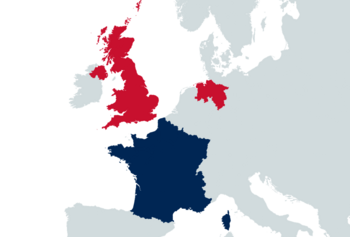Franco-British Union
Union of the United Kingdom and the French Republic Union du Royaume-Uni et de la République française | |
|---|---|
|
Flag | |
| Motto: "L'unité dans la solidarité" "Unity In Togetherness" | |
| Anthem: God Save the Queen (United Kingdom) La Marseillaise (France) | |
 Red denotes the United Kingdom while Blue denotes the French Republic | |
| Capital | London (United Kingdom) Paris (France) |
| Largest city | London |
| Official languages | English French |
| Regional and minority languages | |
| Demonym(s) | |
| Government | Unitary[1] parliamentary constitutional monarchy & Unitary semi-presidential republic |
| Alexandra | |
| Emmanuel Macron | |
| Justine Greening | |
| Élisabeth Borne | |
| Legislature | 2 national legislatures |
| House of Lords House of Commons | |
| Senate National Assembly | |
| Formation | |
• Reign of Clovis I as King of the Franks | 481-511 |
| 10 August 843 | |
| 3 July 987 | |
| 1535 and 1542 | |
| 1535 and 1542 | |
| 1 May 1707 | |
| 22 September 1792 | |
| 1 January 1802 | |
| 5 December 1922 | |
| 20 November 1924 | |
| 1 January 1958 | |
| 3 June 1958 | |
| Area | |
• Total | 933,910 km2 (360,580 sq mi) (31st) |
• Water (%) | 2.2 |
| Population | |
• Estimate | 145,296,439 (10th) |
• Density | 155/km2 (401.4/sq mi) (82nd) |
| GDP (PPP) | 2021 estimate |
• Total | $7.679 trillion (4th) |
• Per capita | $52,850 (29th) |
| GDP (nominal) | 2021 estimate |
• Total | $6.548 trillion (3rd) |
• Per capita | $45,066 (23rd) |
| Gini (2021) | medium |
| HDI (2021) | very high (22nd) |
| Currency | entente (E) |
| Time zone | UTC+1 +2 |
| Driving side | right (United Kingdom) left (France) |
| Calling code | +44 (United Kingdom) +33 (France) |
| Internet TLD | .uk (United Kingdom) .fr (France) |
The Franco-British Union, formally known as the Union of the United Kingdom and the French Republic (French: Union du Royaume-Uni et de la République française), is a dual state and bi-confederation consisting of the United Kingdom and the French Republic, located in northwestern Europe. As a whole, it is bordered by the Atlantic Ocean to the west, the Mediterranean Sea to the south, followed by the English Channel and the North Sea to the north and northeast. Meanwhile, it also borders a number of countries worldwide, which includes Spain, Andorra, Belgium, the Netherlands, Germany, Luxembourg, Switzerland, and Italy in Europe, while in the Americas, it borders both Suriname and Brazil. Its total area is 360,580 square miles (933,910 km2), with a total population of 143 million.
In line with its bi-confederated nature, both the United Kingdom and France uses a largely different form of government, with the United Kingdom being a unitary parliamentary constitutional monarchy, while the latter is otherwise a unitary semi-presidential republic. The British monarch is Queen Alexandra while the French president is Emmanuel Macron, both of whom assumed their respective positions in 2017. The UK's capital city is London, which is also the largest city in the union itself. Meanwhile, unlike France, the United Kingdom consists of approximately five constituent countries: England, Scotland, Wales, Hanover, and Northern Ireland. On the other hand, France consists of its own metropolitan area in mainland Europe, coupled with its overseas territories which includes French Guiana, Saint Pierre and Miquelon, the French West Indies, and many islands in Oceania and the Indian Ocean. On the British side, there are approximately fourteen overseas territories recognised as part of its jurisdiction. The Isle of Man, Guernsey, and Jersey are otherwise known as Crown Dependecies, hence, they are not officially considered to be part of the United Kingdom, although matters relating to defence and international representation fall under the British government.
- ↑ Although the United Kingdom has traditionally been seen as a unitary state, an alternative description of the UK as a "union state", put forward by, among others, Vernon Bogdanor, has become increasingly influential since the adoption of devolution in the 1990s. A union state is considered to differ from a unitary state in that while it maintains a central authority it also recognises the authority of historic rights and infrastructures of its component parts.
- ↑ Although the monarch is officially recognised as the crowned head of both the United Kingdom and France, their traditional powers as a constitutional monarch have largely been confined towards dealing with political affairs within the United Kingdom, while the President of France otherwise assumes their own traditional duties as the French head of state.
- ↑ Likewise, although the president is officially recognised as the presidential head of both the United Kingdom and France, their traditional powers as a ceremonial president have largely been confined towards dealing with political affairs within the French Republic, while the British monarch otherwise assumes their own traditional duties as the British head of state.
